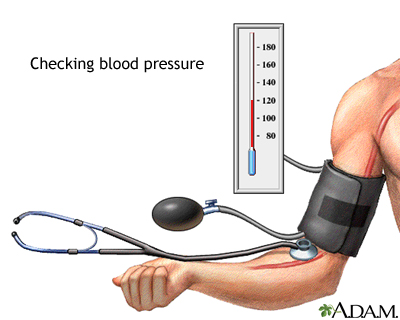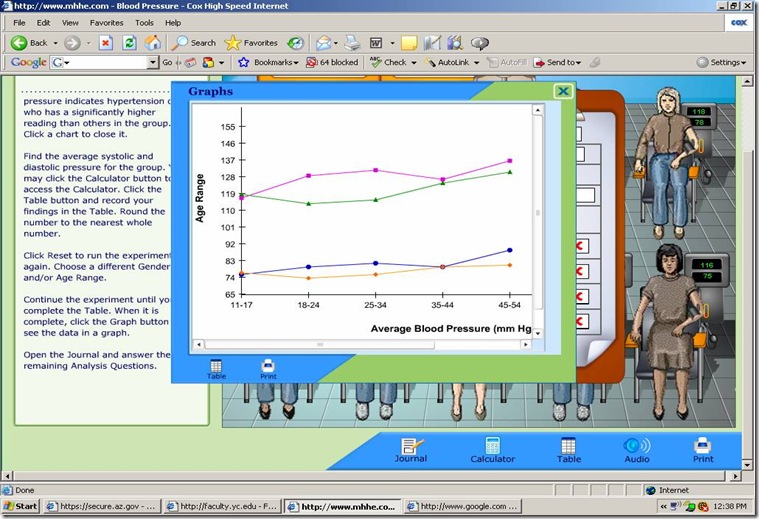
With the male patients their systolic pressure seems to increase with age and their diastolic remains study until the ages 35-44 there there is an increase. As for the female patients, the blood pressures (systolic and diastolic) seems to stay at a steady pace, but increase between the ages of 44-54. I know that this increase is due to menopause.
With aging the heart and circulatory system do not work as well as they do when you are younger. This is due to the arteries becoming less elastic, there is narrowing and the heart muscle has to work harder to pump blood, making your blood pressure higher. With the data that I have collected, it would seem to me that males are at greater risk for high blood pressure the females.
I would take one person, male and female, from each age group and then do a comparison over a period of time to see who is actually at risk for high blood pressure. I would take their blood pressure's weekly to use for comparison. I would do an average systolic and diastolic because the age groups vary. I would record their blood pressures and see how it rises or falls. Many things can effect blood pressure besides age. Anger, pain, and many other things can increase the blood pressure. Also, medications can lower blood pressure. These would not be included in my recordings because they are false readings. I would also record if any patients are affected by hereditary high blood pressure, if they suffer from any disease, do they exercise, and eat right.
The blood pressure seemed to stay at a steady level for the female patients and the male stayed steady up until ages 31-44. Female blood pressure did increase when the reached the ages 45-54. Even then as they aged more then 54 their blood pressure went higher. Also, there were 3 patients who had an aliment. One patient had very poor nutrition, because of their income. They would eat only fatty foods, which effects the blood pressure tremendously because of the fatty build in the arteries in the heart. Another patient (female)has heritary high blood pressure and they suffered high blood pressure throughout the study. The third patient (male) suffered from obesity and lack of exercise. These two factors have a critical effect on blood pressure because the heart is working double time to get the blood through it. With obesity there is a lot of extra fat surrounding the heart and through the major arteries in the heart.
Yes, the results support my hypothesis because the only thing that really was effected were the 3 patient who had aliments and they prove that they will have high blood pressure due to their conditions. As for age and gender the males have a higher risk for high blood pressure. As for their age the blood pressure increases at a faster rate the females. Females blood really rises when they hit the menopause age. Factors that effect blood pressure obviously would have a big impact on anyone's blood pressure, die., obesity, disease, heritary, and no activity.
One patient had a reading of 160/100 and that is abnormal. With looking at his chart, this patient was suffering from high cholesterol, no activity, poor diet and alcohol consumption on weekends. All these factors putting this patient at risk for a heart attack! These factors can change if the patient puts in the effort.
Risk factors for hypertension include obesity, high sodium diet, no activity, alcohol consumption, and family history. I believe that family history is the most closely associated with hypertension because some people can live healthy lives, but because hypertension runs in the family they can still suffer from it.
Obesity has a huge impact on blood pressure because it is making the heart work harder and can cause the heart to grow to abnormal size. Obesity can be the lone factor that causes hypertension because of all the excess fat in their bodies. Fat causes high cholesterol which leads to hardening of the arteries in the heart. People with disease, poor diet, no activity and heritary are all factors that can cause hypertension.



No comments:
Post a Comment